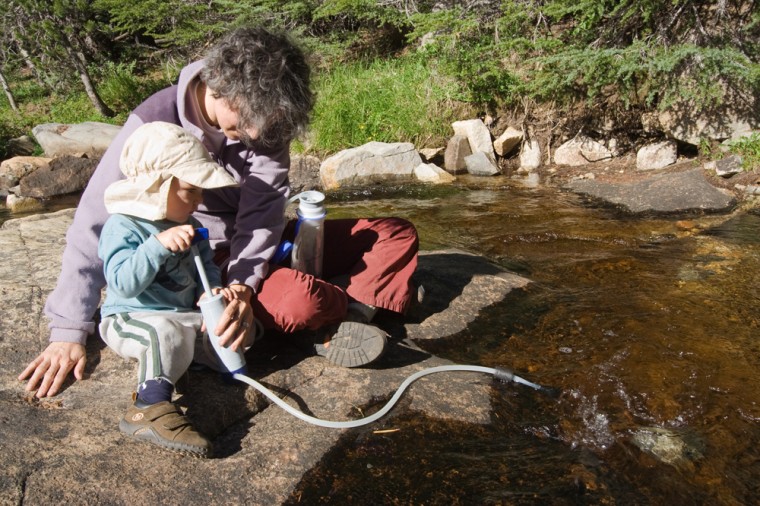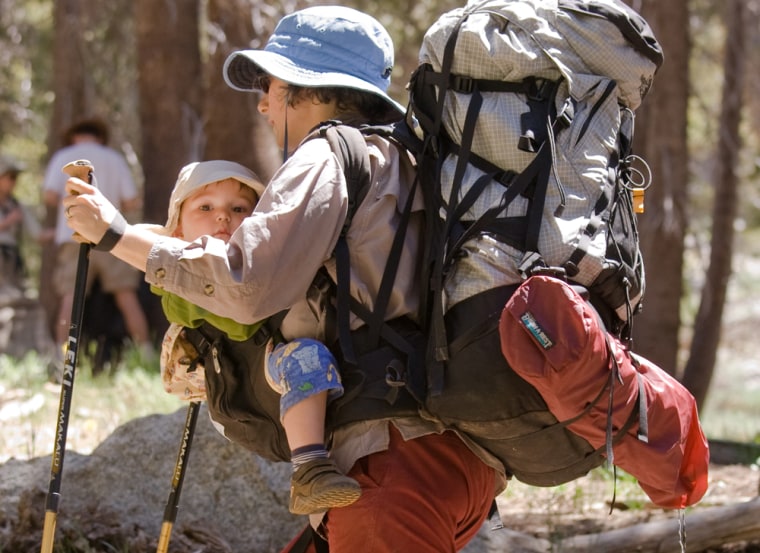It had been at least 24 hours since we had seen other humans, and the trail seemed to be ours alone — gleaming granite slabs, scrabbly switchbacks, glorious glimpses of the Grand Canyon, the Tuolumne River and jagged Sierra spires under cloudless skies.
But the meditative crunch-crunch-crunch of our boots soon gave way to men's voices. A trio of bearded 20-somethings approached.
"Whoa, baby!" gasped the group's gnarly looking leader, pointing to our son, snuggled up in a baby carrier on my chest.
"Lucky dude! He gets a free ride!" joked another.
"Can you carry me, too?" wheezed the laggard.
My husband, Stephen, and I stopped to chat with them. It was our fourth Yosemite trip of the year, and we had become accustomed to questions, comments and astonished stares from nearly everyone we met. Few people have seen a toddler in the back country — let alone a woman carrying a loaded backpack, plus her child strapped to the front.
But, judging from the number of people who ask us how to do it, many people are curious. Here's a primer on "Backpacking with Baby," or BWB as I call it.
With or without a baby, backpacking isn't necessarily difficult. But it requires more preparation and gear than camping, which usually means pitching a tent in a car-friendly campsite, cooking s'mores in a fire pit, and doing day hikes. Compared to the rigors of backpacking, campers enjoy relative luxuries such as outhouses, potable water and picnic tables.
By contrast, backpackers strap everything onto packs, then hike away from the trailhead to set up camp in the wilderness. They filter water from streams. They eat trail mix, turkey jerky or easy-to-prepare food — dehydrated soup, instant oatmeal and other meals cooked on lightweight stoves. They sit on logs, write in diaries, play cards, read paperbacks or simply savor the silence, stars and scenery.
My husband introduced me to backpacking eight years ago with a trip to California's Lost Coast, the rugged, remote stretch of mountains and beaches about 250 miles northwest of San Francisco. We woke at dawn and had a remote beach to ourselves — no other people in sight, only sea lion pups and shorebirds. We vowed to go backpacking at least once a month (except in the winter).

We took a hiatus after the birth of our son, Levi, in 2005. But when the Sierra snow started melting in early 2006, Levi was 10 months old, and we reached for our packs.
Our first BWB trip was a snowbound overnight excursion near a glacier in the eastern Sierra, where Levi learned to crawl on the soft floor of our tent. Levi — perfect child in every way, except for abysmal sleeping habits — slept through the night for the first time.
As any desperate, bleary-eyed new parent would have, we decided to resume our backpacking schedule — if only to sleep soundly once a month!
In the following year, we honed BWB to a science. In the garage is a checklist of items not to leave behind (though we often forget to look at it). We have tent set-up and teardown routines, and favorite foods for dinner, lunch and breakfast.
Levi, now 2, jumps for joy when he sees us stuffing our clothes and sleeping bags into our packs. He shouts phrases like "Levi, mommy, daddy — hiking to snow on Mount Lassen!"
He loves eating gorp (a homemade trail mix loaded with M&Ms), taking naps in his backpack, playing hide and seek behind redwoods, and sleeping mushed up next to his parents in a two-person tent.
We know BWB is not for everyone — it'd be tougher with two or more kids, or in parts of the world not blessed with California's reliably sunny summer. But adventuresome parents can start with the following 10 tips:
1. Downgrade expectations: You can't travel fast or far while carrying a heavy pack and a toddler. Six miles a day with elevation gain is a "beat-out." Three miles a day is manageable if you're in shape.
The goal is to experience the wilderness with your family — not train for an Everest ascent. Consider gentle trails; instead of hiking to the top of Yosemite's Half Dome, try the lower, flatter Hetch Hetchy Reservoir. (You'll end up avoiding the crowds, too.)
2. Be prepared: Besides maps, flashlights and other emergency gear, take extra warm baby clothes. Take Baby Tylenol or other medicine in case of scrapes, stings and bruises. Have a water pump and travel near streams. (Breast-feeding mothers take note: You'll drink more water than you've ever thought possible.) Take extra food. Tell rangers your planned trail, number of people in party, entrance and exit dates.
3. Bring sherpas: We've gone as a nuclear family but are happy to offload food and gear to accompanying friends and relatives — especially those with strong backs.
4. Gear up: I carry my fits-like-a-glove North Face pack, and I strap Levi to my chest with the Ergo baby carrier. (It fits on the front or back and is far more comfortable, lightweight and packable than anything else I've tried, particularly external-frame baby carriers.) Trekking poles lend stability on uneven terrain.
5. Take cloth diapers: Brands such as Wonderoos and FuzziBunz are absorbent, wicking and fast-drying — no different from your fleece jacket. If the diaper is merely wet, hang it on your backpack or tent to dry quickly in the sun, which kills odors.
Seal soiled diapers in plastic bags and carry them out.
Take care not to contaminate water sources. National Park Service rules prohibit the disposal of human waste within 100 feet of a water source or camp site, or within sight of a trail. The Park Service has also adopted principles from the Leave No Trace Center for Outdoor Ethics, which recommend that human waste be buried 6 to 8 inches deep and that washing (whether it's baby or dishes or anything else) be done with water carried 200 feet away from streams or lakes, using small amounts of biodegradable soap.
Some trails require hikers to haul out all human waste. A portable container called a Wagbag is one way to do it; depending on where you go with baby, you might be hauling it for two.
6. Get dirty: Campsites are full of sap, mud and bugs — even truly vile stuff like bear scat and maggots. Everyone gets filthy. Wipe down the baby with a damp bandana and look forward to a long bath upon return.
7. Mind the crumbs: Bears and other critters will search out food, even a crumb, noodle, raisin or other baby reject. Take care to reduce spills, and pack everything (even toothpaste) in bear-proof containers.
8. Pack small treasures: A favorite snack, book or toy goes a long way to short-circuiting a meltdown. We bring "Goodnight Moon," a harmonica and Ginger, the well-traveled stuffed dog, to maintain some semblance of routine.
9. Start young: My husband started backpacking as a toddler with his parents. (Lacking our high-tech cloth diapers, they rented mules to haul disposables in and out of Wyoming's Wind Rivers.) Wilderness trips are great family bonding experiences.
10. Enjoy the difficulties: I love challenging myself physically on backpacking trips. The sense of accomplishment and power is exhilarating. Backpacking with a baby is even more of a rush. I feel like an Amazon woman when I'm carrying a 30-pound backpack and my 28-pound toddler — a superhero who can safely deliver my child into or out of any situation, no matter the altitude or distance.
Backpacking has made me a better mother and person — and I'd love to see more parents on the trail!
